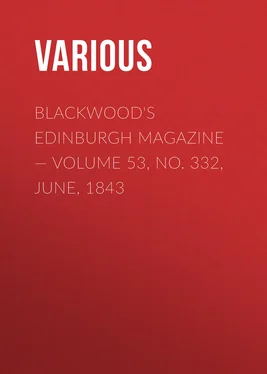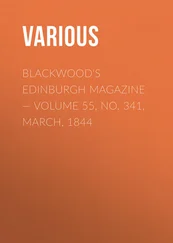Various - Blackwoods Edinburgh Magazine – Volume 53, No. 332, June, 1843
Здесь есть возможность читать онлайн «Various - Blackwoods Edinburgh Magazine – Volume 53, No. 332, June, 1843» — ознакомительный отрывок электронной книги совершенно бесплатно, а после прочтения отрывка купить полную версию. В некоторых случаях можно слушать аудио, скачать через торрент в формате fb2 и присутствует краткое содержание. Жанр: foreign_antique, periodic, foreign_edu, на английском языке. Описание произведения, (предисловие) а так же отзывы посетителей доступны на портале библиотеки ЛибКат.
- Название:Blackwoods Edinburgh Magazine – Volume 53, No. 332, June, 1843
- Автор:
- Жанр:
- Год:неизвестен
- ISBN:нет данных
- Рейтинг книги:4 / 5. Голосов: 1
-
Избранное:Добавить в избранное
- Отзывы:
-
Ваша оценка:
- 80
- 1
- 2
- 3
- 4
- 5
Blackwoods Edinburgh Magazine – Volume 53, No. 332, June, 1843: краткое содержание, описание и аннотация
Предлагаем к чтению аннотацию, описание, краткое содержание или предисловие (зависит от того, что написал сам автор книги «Blackwoods Edinburgh Magazine – Volume 53, No. 332, June, 1843»). Если вы не нашли необходимую информацию о книге — напишите в комментариях, мы постараемся отыскать её.
Blackwoods Edinburgh Magazine – Volume 53, No. 332, June, 1843 — читать онлайн ознакомительный отрывок
Ниже представлен текст книги, разбитый по страницам. Система сохранения места последней прочитанной страницы, позволяет с удобством читать онлайн бесплатно книгу «Blackwoods Edinburgh Magazine – Volume 53, No. 332, June, 1843», без необходимости каждый раз заново искать на чём Вы остановились. Поставьте закладку, и сможете в любой момент перейти на страницу, на которой закончили чтение.
Интервал:
Закладка:
And yet, and yet, are not those the true views, after all? Are the effects to be forgotten in the instruments, or is it not the result which forms the character of the whole? Are we to think of the dagger which strikes the master of a throne, as only the steel in the hand of an assassin, or as the summoner to civil war and the subversion of thrones? Is the pen which pours political frenzy through the hearts of living millions, or sheds the splendours of poetry over millions still to come, to be valued only as the feather of a bird? Or is the press itself to be remembered only as a dexterous combination of springs and screws; or to be bowed down to as the steward of all the hidden treasures of mind—as the breaker of intellectual chains, the avenger of injured rights, the moral Hercules that goes forth turning the wilderness to fertility, and smiting the monsters of the world?
But among the wonders of the time, there was one which struck me with prodigious force, which has remained on my recollection to this hour, and which still survives with undiminished vividness. It was the acting of Siddons.
The stage is now almost undone. The absurd liberalism of the day has given every corner of London a theatre, and has degraded the character of the stage in all. By scattering the ability which still exists, it has stripped the great theatres of the very means of representing dramatic excellence; while, by adopting popular contrivances to obtain temporary success, they have driven away dramatic genius in contempt or in despair. Our stage is now condemned to be fed like a felon from the dungeons, and, like the felon, to feel a stigma in every morsel which it puts between its lips. It must stoop to French frivolity, or German extravagance, and be glad to exist upon either. Yet, why should not higher names come to its aid? Why should not the State relieve the difficulties of a great institution, which might be made to repay its assistance a thousand-fold? Is there nothing that could be withdrawn from the waste of our civil lists, or the pomp of public establishments, to reunite, to purify, and even to exalt the stage? The people will have theatres. Good or evil, noble or degraded, the stage will be demanded by the people. Is it a thing indifferent to our rulers, to supply them with this powerful and universal excitement in its highest degree of moral influence, or in its lowest degree of impurity; to bring before them, with all the attractions of the drama, the memory of heroes and sages, patriots and martyrs, or leave them to rake for the indulgence of eye and ear in the very kennels of crime?
"They order those things better in France."
Unquestionably. The care of Government there protects the national taste, and prevents the theatres from looking for subsistence to the history of the highway. The vices which now haunt theatres are no more necessary to their nature, than to the senate or the palace. Why should not the State interpose to prevent the sale of poison on the stage, as in the streets? Why should it not offer prizes and honours for great tragedies and comedies, as soon as it would for a voyage to the Arctic or Antarctic? But is dramatic genius dead in England? What, in England! where nothing dies—where every faculty of the heart and understanding is in the most perpetual activity—where the noblest impulses are perpetually pushing forward to the noblest ends—where human nature moves in all its vigour, from hour to hour, without disguise—where the whole anatomy of the moral frame is visible, and all its weakness, and all its wonders, are the daily spectacle of all mankind!
In giving these opinions of the powers of the stage, need I guard them by saying, that I contemplate a higher spirit than the drama even of Shakspeare has ever displayed—one which, to the vigour of his characters, and the splendours of his poetry, should add a moral of which his time was scarcely conscious? My idea would approach more nearly the objects of the great Greek dramas, in which the first sympathies of the people were appealed to by the most powerful recollections of historic virtue; their national victories over the Persian, the lofty conceptions of their Olympus, the glories of their national power, and the prospects of their imperishable renown. I contemplate nothing of the weakness, locality, or license, of our old drama. I think only of a rich and lofty combination of characters above the level of our time, thoughts belonging to that elevation, feelings more generous, vivid, and majestic, and exploits uniting the soaring spirit of old romance with the sustained strength of modern energy; Greece in her brightest days of intellectual lustre, Rome in her most heroic days of patriotism, and England in those days which are yet to come, and which shall fill up her inheritance of glory.
Siddons was then witching the world—witching, in its more solemn sense; for though her smile was exquisite, she might have sat for the picture of a Sybil or a Pythoness. The stage had never seen her equal, and will probably never see another so completely formed to command all its influences. Yet her beauty, her acting, even her movement, were characteristic, and their character was noble melancholy. I never saw so mournful a countenance combined with so much beauty. Her voice, though grand, was melancholy—her step, though superb, was melancholy; her very smile was melancholy; and yet there was so much of living intellect in her expression, such vast variety of passion in her look and gesture; she so deeply awoke the feelings, or so awfully impressed the mind; thus it was impossible to escape the spell, while she moved upon the stage.
In this language there is not the slightest exaggeration. I have seen a whole audience burst into tears at a single tone of her voice. Her natural conception was so fine, that the merest commonplace often received a living spirit from her lips. I have seen a single glance from her powerful eye hush an audience—I have seen her acting sometimes even startle and bewilder the actors beside her. There is perhaps a genius for every art, and hers was the genius of the stage—a faculty of instant communication between the speaker and the hearer, some unaccountable sympathy, the power to create which belongs to but one in millions, and which, where it exists, lifts its possessor to the height of the Art at once, and constitutes perfection.
It may be presumed that I saw this extraordinary being whenever it was possible. But her chef-d'œuvre , in my eyes, was the "wife of Macbeth." The character seemed made for her, by something of that instinct which in olden times combined the poet and the prophet in one. It had the ardour and boldness mingled with the solemnity and mystery that belonged to the character of her beauty.
Her entrance was hurried, as if she had but just glanced over the letter, and had been eager to escape from the crowd of attendants to reperuse it alone. She then read on, in a strong calm voice, until she came to the passage which proved the preternatural character of the prediction. "They have more in them than mortal knowledge. When I burnt with desire to question them further, they made themselves into air and— vanished ." As she was about to pronounce the last word, she paused, drew a short breath, her whole frame was disturbed, she threw her fine eyes upwards, and exclaimed " Vanished !" with a wild force, which showed that the whole spirit of the temptation had shrunk into her soul. The "Hail, king that shall be!" was the winding-up of the spell. It was pronounced with the grandeur of one already by anticipation a Queen.
Her solitary summons to her distant lord followed, like an invocation—
"Hie thee hither,
That I may pour my spirits in thine ear;
And chastise with the valour of my tongue
All that impedes thee from the golden round."
Интервал:
Закладка:
Похожие книги на «Blackwoods Edinburgh Magazine – Volume 53, No. 332, June, 1843»
Представляем Вашему вниманию похожие книги на «Blackwoods Edinburgh Magazine – Volume 53, No. 332, June, 1843» списком для выбора. Мы отобрали схожую по названию и смыслу литературу в надежде предоставить читателям больше вариантов отыскать новые, интересные, ещё непрочитанные произведения.
Обсуждение, отзывы о книге «Blackwoods Edinburgh Magazine – Volume 53, No. 332, June, 1843» и просто собственные мнения читателей. Оставьте ваши комментарии, напишите, что Вы думаете о произведении, его смысле или главных героях. Укажите что конкретно понравилось, а что нет, и почему Вы так считаете.












